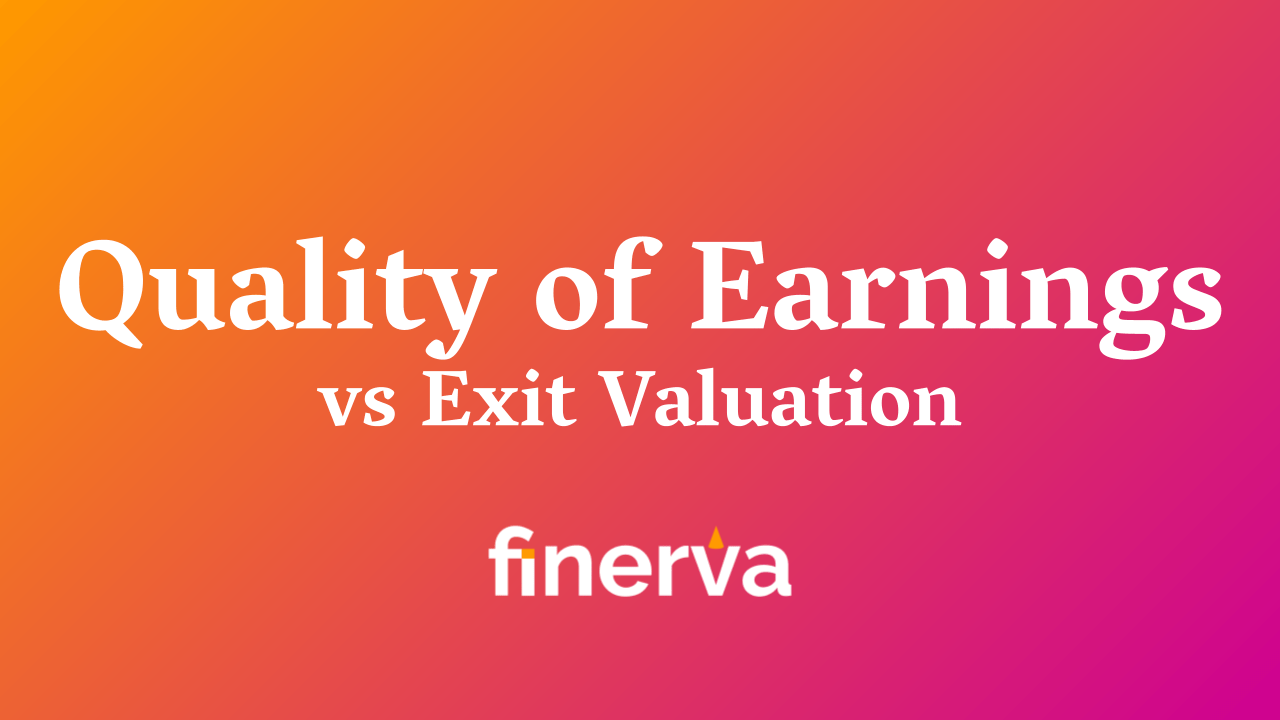How Quality of Earnings (QofE) Affects Your Exit Valuation

When it comes to selling your business, one of the aspects the buyers will be most interested in is undoubtedly its ability to make money.
Financial forecasts, earnings projections and proven track record of profitability are perhaps even more important at this stage than when you’re raising investment. However, it’s important to keep in mind that, even when it comes to earnings, it’s often “quality over quantity”.
During due diligence, the buying-side of an exit deal will try to assess the “quality of earnings” of your company, typically starting from the financial statements and working their way down, removing any anomalies, accounting irregularities or external factors that may skew the real bottom-line of the business.
Of course, proving a high quality of earnings should be the seller’s objective, as a positive assessment on the accuracy of the company’s past financial statements and future forecasts plays in their favour when calculating the underlying EBITDA or revenue, therefore boosting its valuation within the deal.
What are the factors affecting quality of earnings?
There are both internal and external factors that may affect a company’s quality of earnings.
Some have to do with the normal risky nature of business, and should always be disclosed upfront and accounted for in forecasts, to show full awareness and transparency.
Others have to do with incorrectly applied accounting practices that tend to increase or decrease reported earnings to satisfy short-term needs. These, of course, should be avoided whenever possible, or, at the very least–reviewed in depth during a sale to avoid unpleasant surprises during due diligence.
Examples of internal factors include:
- High proportion of revenue is contracted with customers on multi-year contracts (recurring revenue) or if not is highly predictable and repeatable indicating strong customer goodwill.
- Correct and prudent application of accounting practices and management judgements (where required).
- Credit terms with customers – for example direct debit payment collections from customers or regular enterprise customers with strong credit backgrounds will be viewed positively. If income is reported under loose payment terms, it can increase the risk of bad debt which can be a value detractor.
Examples of external factors include:
- Temporary fluctuations in demand caused by large-scale external causes — for example pandemics, wars and major geopolitical decisions (e.g. Brexit).
- Periods of high inflation, which negatively erode a quality of earnings, effectively devaluing reported revenue and EBITDA figures.
- Fluctuations in interest rates which can affect quality of earnings for companies with large debt by increasing or decreasing interest payments – also an important consideration if an acquirer is using debt to finance the acquisition.
After assessing all of these factors during due diligence, the buyer — or most often an independent entity — may produce a quality of earnings (QofE) report.
What does a QofE report include?
A QofE report will typically include some key findings and financial metrics for your business including:
- Recurring or repeatable revenues, and maintainable EBITDA.
- Normalised EBITDA levels, including add backs to bridge from reported EBITDA to adjusted EBITDA.
- EBITDA to cash conversion.
- Any significant fluctuations in reported financial information, both annual and monthly.
- Key income metrics such as revenue and gross margin divided by product, customer or distribution segments.
- A summary of operating expenses and employee analysis.
- Significant highlights from the balance sheet, such as analysis of accounts receivable.
- Normalised levels of working capital and cash reserves over time.
Aside from hard data, it will also include the answer to more nuanced questions, such as:
- Did any one-time events affect your financial performance or growth?
- Have working capital reserves and positive cash flow been protected with good financial practices?
- How are any discretionary expenses affecting EBITDA?
- Are compensation packages, rent rates and other discretionary policies in line with the market?
- Are the assumptions underpinning the growth rates reliable and conservative?
- How did revenues and earnings stand up during COVID-19?
What can you do to maximise your quality of earnings?
Ensuring that your financial reports follow an internationally respected Generally Accepted Accounting Principles (GAAP), is the most significant step you can take ahead of an exit to make sure your QofE report is positive.
This generally means ensuring that your financial reports are:
- Reliable, by presenting verifiable, unbiased and accurate metrics.
- Relevant, by showing timely, supportable data that can be used for accurate forecasts.
Ahead of the due diligence process, it’s a good idea to have your accounts reviewed by a chartered accountant with business exit experience, who can identify possible pain-points ahead of time and help you produce accurate reports and forecasts for the buyer.
The information available on this page is of a general nature and is not intended to provide specific advice to any individuals or entities. We work hard to ensure this information is accurate at the time of publishing, although there is no guarantee that such information is accurate at the time you read this. We recommend individuals and companies seek professional advice on their circumstances and matters.




